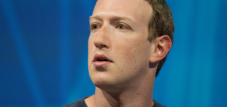Published on: May 5, 2025 / update from: May 5, 2025 - Author: Konrad Wolfenstein

Shock for the advertising industry: With KI Will Zuckerberg with Meta, advertising completely automate - $ 72 billion investment - Image: Xpert.digital
Does Mark Zuckerberg make advertising agencies superfluous? The 'Black Box' advertising: How Meta wants to turn the market upside down with AI
No copywriter, no strategist: Zuckerberg outlines the future of advertising - without any agencies
In a sensational interview with Tech strategist Ben Thompson, Mark Zuckerberg outlined a vision that could shake the advertising industry in its foundations. The meta-CEO plans nothing less than to take over the entire value chain of advertising by massive AI use-from the creation to targeting to success measurement. This development could make traditional agencies, creative service providers and many other actors in the industry superfluous. With an enormous AI budget of up to $ 72 billion for 2025, Meta underlines the seriousness of these intentions and prepares for a fundamental change in the advertising market.
Suitable for:
- The cash machine is running: $ 62 billion! Meta's sales tsunami exceeds expectations with 59% growth
Zuckerberg's ultimate advertising vision
“We’re going to get to a point where you’re a business, you come to us, you tell us what your objective is, you connect to your bank account, you don’t need any creative, you don’t need any targeting demographic, you don’t need any measurement, except to be able to read the results that we spit out. I think that’s going to be huge, I think it is a redefinition of the category of advertising.”
With these words, Zuckerberg describes his idea of the future advertising business in the Stratechery interview. The vision is as simple as radical: Companies call META their business goal, connect their bank account, and the AI does the rest. No creative department, no demographic targeting, no complex success measurement-all of these tasks takes over the AI-controlled platform.
This “ultimate business agent” strategy goes far beyond previous automation approaches. Zuckerberg speaks of a complete redefinition of advertising as a category. He is convinced that the proportion of advertising spending on GDP could grow significantly through this transformation, since advertising becomes more efficient and more accessible.
The fully automated advertising approach
Meta is already relating to AI-controlled advertising through the “Advantage+” system. Advertisers only determine the company's goal, target country, budget and basic ad design-"Our AI systems then do the rest," explains Metas Global Advertising chief Nicola Mendelsohn.
The first results seem to confirm Zuckerberg's vision: Return on adspend (Roas) is intended to increase by 32 percent on average for such AI-controlled campaigns, while the costs per acquisition decrease by 17 percent. These efficiency gains could be convincing for many companies, even if they partially submit control of their advertising strategy.
Massive AI investments as a foundation
To realize its vision, Meta invests in an unprecedented scope in AI infrastructure. For 2025, the company recently increased the budget for investment expenditure (Capex) from 60-65 billion to $ 64-72 billion. These enormous sums flow primarily into the expansion of AI capacities.
Zuckerberg plans to build a data center with over 2 gigawatts of power - a system that "would cover a significant part of Manhattan". By the end of 2025, META should be available to more than 1.3 million graphics processors. This massive computing power forms the technological foundation for the AI revolution in advertising.
The focus of the investments has shifted significantly. While Zuckerberg in 2021/2022 still strongly focused on meta -verse, Meta is now clearly focusing on AI as a central growth driver. This strategic realignment shows how serious the company is with the AI-based transformation of the advertising business.
Four pillars of the AI strategy
In an interview with Stratechery, Zuckerberg outlines four central business opportunities for Metas AI initiative:
- Optimization of the advertising business: through AI-based advertising regeneration, targeting and measurement of success, companies should achieve maximum results with minimal effort.
- Increase in the user management: AI should not only deliver better content recommendations, but also increasingly also help or generate them completely in creating content.
- Business messaging: AI agents should take over customer support and sale for companies and thus create new monetization options for METAS messaging platforms.
- AI-native offers: This includes META AI, which is already used every month by one billion people and is to be monetized by premium subscriptions in the future.
The AI revolution in advertising production
The AI models developed by META are already fundamentally transforming advertising production. With the “Generative ADS Recommendation Model” (Gem), Meta analyzes gigantic data amounts within a very short time in order to adapt ads to individual users. After the first tests, Gem was able to increase the advertising conversions by up to 5%.
The AI influence is also noticeable in creative production. The “Advantage+ creative suite” in the ADS manager includes tools that generate variations of existing images, change backgrounds and adapt image dimensions for different formats. These technologies can drastically lower production costs and accelerate the scaling of campaigns.
Meta AI as a data collector
Meta AI, which is now available as an independent app, plays a central role in Metas AI. This collects valuable data through conversations with users that can be used for even better targeting. Meta plans to monetize these AI services through a paid subscription-with exclusive functions, faster processing and better personalization.
It is noteworthy that META also plans to use public user content in the EU for training its AI. From May 27, 2025, publicly accessible data from users in META products are to be used for AI development-a step that raises data protection concerns.
Effects on the advertising industry
The consequences of Metas AI offensive for the advertising industry could be serious. Matthias Schrader, CEO at OH-SO Digital, denotes Zuckerberg's vision in a LinkedIn post as “brutal” and warns: “Mark Zuckerberg wants to replace agencies with AI. We should take it seriously.”
Friedrich Dromm, founder of Try No Agency, even predicts: "As early as 2028, there will no longer be classic advertising agencies as we know them." He refers to statements like Sam Altman (Openaai) that “up to 95% of today's agency tasks are replaced by AI - faster, cheaper, better.”
The new agency landscape could look significantly slimmer: "It does not need a junior textor, no kind of directors, no strategists, no productioners, no consultants. What remains, are top creative on CD and/or management levels who orchestrating. The rest? Redundant."
Suitable for:
The black box effect
A significant disadvantage of complete automation is in the “Black Box effect”: Advertisers no longer know exactly what criteria and at what prices the algorithms are running out their campaigns. Media experts therefore advise that in addition to automated campaigns to continue to play manually booked advertising in order to be able to compare the results.
This loss of control could be problematic how a LinkedIn comment on Zuckerberg's vision shows: "AI is brilliant in pattern recognition, but has no concept of brand legacy, market positioning or ethical nuances." The vision of a completely AI-controlled advertising machine is therefore also met with skepticism.
Autonomous advertising: How much control does the companies have?
Despite the technological possibilities, it remains questionable whether companies are willing to completely deduct their advertising strategy to Meta. As Heise.de notes: "Agencies and companies usually have concrete ideas about their products, target groups and the idea of what they want to stand for. To cede everything on Meta may be easy, maybe even successful, but not necessarily a sustainable strategy."
Data protection concerns could also brake metas plans. The EU has already expressed concerns about metas “Pay or Consent” model, and the use of user data for AI training is under observation by the European data protection authorities.
In addition, the question arises of the transparency of the system. While Meta is increasingly taking control of the advertising, it remains unclear how transparently the processes and costs for advertisers will be. Zuckerberg speaks of providing evaluations, but what they encompass and what you ultimately pay for has to be shown.
A new era of advertising?
Metas AI offensive under Mark Zuckerberg has the potential to fundamentally change the advertising industry. With enormous investments in AI infrastructure and the vision of a fully automated advertising machine, the company could question traditional structures in the industry.
While the efficiency gains and simplified processes could be tempting for many advertisers, questions about control, transparency and data protection remain. The industry faces the challenge of adapting this new reality or finding niches in which human creativity and strategic thinking continue to offer added value.
Whether Zuckerberg's vision of a “redefinition of advertising” becomes a reality depends not only on the technological development, but also whether companies are willing to put their advertising strategy in the hands of an algorithm. However, what seems safe: the AI revolution in advertising has just started and Meta is positioning itself at the head of this movement.
Suitable for:
Your global marketing and business development partner
☑️ Our business language is English or German
☑️ NEW: Correspondence in your national language!
I would be happy to serve you and my team as a personal advisor.
You can contact me by filling out the contact form or simply call me on +49 89 89 674 804 (Munich) . My email address is: wolfenstein ∂ xpert.digital
I'm looking forward to our joint project.













